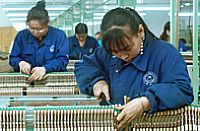Family and Fertility
The Body Economic
by Masum Momaya, Curator
Around the world, women's economic opportunities and choices have long been impacted by their ability to bear children. This has been true for women across socioeconomic classes, historically as well as in the present day. When it comes to employment and life decisions, women and their families frequently make tough choices and poignant trade-offs, which are either helped or made more difficult by public policies concerning fertility, work, and social roles. Too often, these policies are driven more by economic interests and national concerns than women's needs and rights. Read more
|
Photographer M. Scott Brauer presents an intimate look at the lives and struggles of the women living in Guanyan County, a depressed region of Jiangsu Province, China.
|
For the first time in U.S. history, women are half of all U.S. workers, and mothers are breadwinners in nearly two-thirds of families. Heather Boushey explores how this has changed American lives.
|
|
|
Dorothea Diba's poem speaks about the violence against women domestic workers in the Middle East and Asia.
|
An expert sculptor in Pakistan uses unlikely materials to explore feminine and masculine domestic roles.
|
|
|
|
What do fertility and reproduction have to do with the economy, public health, or political stability? A lot more than we realize, says Michelle Goldberg, author of The Means of Reproduction.
|
|
|
Scholars from the Women's Global Health Imperative argue that giving women economic opportunities doesn't just reduce poverty; it can also reduce their risk of getting HIV/AIDS.
|
It's tough being a working mother in the United States, says Karenna Gore Schiff. Working parents need legal and social support. They need more choices such as full-time, part-time, flextime, and time off.
|











